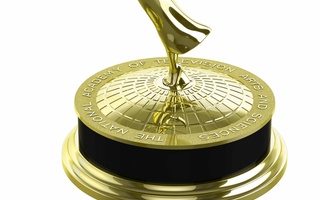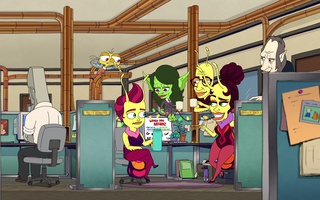{shortcode-8d137a7996a1f334a5a5ca6686e72b53bf3c9dfc}
The 73rd Emmy Awards started with this year's host, Cedric the Entertainer, and fellow guests jamming to the chorus of the opening song, a riff on the Biz Markie classic: “TV, you’ve got what I need.” Unfortunately, the ceremony was interrupted by several too-long comedic bits that didn’t land, making the ceremony drag on. While many of the shows nominated for Emmys this year represented groundbreaking innovations and achievements in television, the ceremony itself fell short of spectacular.
To its credit, the show seemed geared towards helping audiences forget about the global pandemic — sometimes even too effectively. Performative acknowledgments that the show followed COVID-19 protocols seemed to be the only real protocol: Guests, nominees and performers kissing, hugging, and singing do not scream social distancing. Even Seth Rogen remarked[,] “There are way too many of us in this room, what are we doing?” Despite this, the Emmys were a proverbial breath of fresh air. After nearly two years of hardship amidst the pandemic, it was exciting to see some of last year’s most meaningful, unique shows that offered us much[-]needed escape highlighted through the ceremony.
The night was a particular success for Netflix’s acclaimed royal biopic series “The Crown.” Nominated for 20 Emmy Awards this season, “The Crown” took home seven, including their first Emmy for Outstanding Drama Series. Outstanding Lead Actress in a Drama Series winner Olivia Coleman was in disbelief, admitting, “I’d have put money on that not happening.” Outstanding Supporting Actress in A Drama Series winner Gillian Anderson was understandably confused when a reporter asked her whether she had spoken to the long-deceased Margaret Thatcher about her Emmy-winning role. For six-time nominee Anderson, this was her second Emmy win in the arguably most competitive category of the night 24 years after she took home an Emmy for her role in “The X-Files.” Her win marked the end of an incredibly successful awards season for the actress, who also won Golden Globe, Screen Actors Guild, and Critics Choice Television Awards for her portrayal of former Prime Minister Thatcher. From across the pond, with cast and crew gathered in a UK restaurant due to COVID-19 regulations, “The Crown“ made history by being the first show to ever sweep all seven drama categories.
Newcomer “Ted Lasso” dominated the comedic categories, winning a total of four Emmys, including Outstanding Comedy Series. While accepting his award for Outstanding Lead Actor in a Comedy Series, Jason Sudeikis reminded the audience to appreciate and celebrate what’s most important in their lives and communities, explaining that “this show’s about family, this show is about mentors and teachers, this show is about teammates, and I wouldn’t be here without those three things in my life.”
Hannah Waddingham did not only win the Emmy for Outstanding Supporting Actress in a Comedy Show but would have swept the competition for the most relatable speech of the night, opening her acceptance with “ARGHHH Jesus Christ on a bike!” On and off stage, Waddingham was simply a delight — no one else was as excited about every single winner as Waddingham, distinctive in her custom Christian Siriano coral pink pleated chiffon gown.
Sadly, “The Handmaid’s Tale“ told exactly one tale at this year's Emmys: Previous Emmy success is not an indicator of future Emmy success. Out of 21 nominations, “The Handmaid’s Tale“ did not take home a single award, setting a record for the most Emmy losses in a season.
But more importantly, what happened to diversity? The Emmys started out with the most diverse field of nominees in the body’s history. The show’s host and many of the award presenters were BIPOC actors or performers. But not a single person of color won any of the major acting awards. Diversity might have been represented in the nominees but was nowhere to be found among the recipients, despite the number of talented actors of color up for awards.
However, three Emmy winners made history on Sunday night. “RuPaul’s Drag Race“ won the Emmy for Outstanding Competition Program, making RuPaul the most-awarded person of color in Emmy history. Debbie Allen became the first Black woman to ever receive the Governor's Award, and Michaela Coel became the first Black woman to win the Emmy for Outstanding Writing for a Limited Series.
Both of these women did not come to joke around, delivering heartfelt and inspirational speeches that were the highlight of the ceremony. Coel challenged her fellow writers. “Write the tale that scares you, that makes you feel uncertain, that is uncomfortable. I dare you. Do not be afraid to disappear… from us for a while, and see what comes to you in the silence,” she said. “I dedicate this story to every single survivor of sexual assault.”
Allen used her speech to emphasize that each and everyone’s story matters, encouraging the audience, “It is time for you to tell your stories, it will make us a better place.”
Ultimately, the 73rd Emmy Awards underlined the power that television can have. In a world being torn apart by sexism and racism, television must be used as a critical and thought-provoking tool. It is essential to recognize those artists, the ones steering away from the common narrative, using their platform to present untold stories, daring to be different. From this year’s show, it is clear that the Emmys still have a long road to travel to actually recognize and celebrate the diverse talent in television today.
Recommended Articles
-
Graduates Nominated For EmmysMore than 20 Harvard alums were nominated for Emmy Awards, including Stockard Channing ’65 in the supporting actress in a
-
 The 2018 Emmys Manages to be Fitfully Amusing
The 2018 Emmys Manages to be Fitfully Amusing -
2018 Emmys Best-Dressed GuestsFor television's biggest night, it’s only natural for stars to bring the glitz and glam to the red carpet.
-
 ‘Human Resources’ Season One Review: Crass Humor, Touching Storylines
‘Human Resources’ Season One Review: Crass Humor, Touching Storylines -
 Hasty Pudding Woman Of the Year Ceremony Postponed Due to 'Unforeseen Circumstances'
Hasty Pudding Woman Of the Year Ceremony Postponed Due to 'Unforeseen Circumstances'













